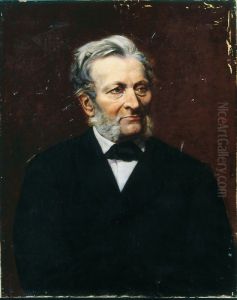Maurycy Sztencel Paintings
Maurycy Sztencel was a Polish-Jewish artist, born in Kraków, Poland, in 1931. His life and career were deeply marked by the traumatic events of World War II, during which he survived the Holocaust. This harrowing experience profoundly influenced his artistic vision, leading him to explore themes of memory, loss, and the human condition through his work. Sztencel's artistic journey began in the post-war years, a period that saw him grappling with the personal and collective traumas of the Holocaust, while also engaging with the broader shifts in European art and culture.
After the war, Sztencel pursued his art education, studying at the Academy of Fine Arts in Kraków, where he was exposed to a variety of artistic movements and techniques. His early work was characterized by a keen interest in figurative painting, with a particular focus on portraiture, through which he sought to capture the essence and emotional depth of his subjects. Over time, his style evolved, incorporating elements of abstract expressionism, a reflection of his ongoing exploration of the psychological and emotional landscapes shaped by his wartime experiences.
Throughout his career, Sztencel remained deeply connected to his roots, often drawing upon Jewish themes and heritage in his work. His paintings frequently featured motifs and symbols reflective of Jewish culture and history, serving as a means to both preserve and interrogate his identity and past. Despite the somber undertones of much of his work, Sztencel's art also conveyed a sense of resilience and hope, a testament to the indomitable spirit of those who, like him, had endured the unimaginable.
Maurycy Sztencel's contributions to art were recognized both in Poland and internationally, with his works being exhibited in galleries and museums around the world. His legacy is that of a survivor who turned the profound depths of his experiences into a powerful and evocative body of work, offering insights not only into his own soul but also into the universal human capacity for endurance and renewal. Sztencel passed away in 2021, leaving behind a rich and poignant oeuvre that continues to resonate with audiences and serves as a poignant reminder of history's shadows and the redemptive power of art.

